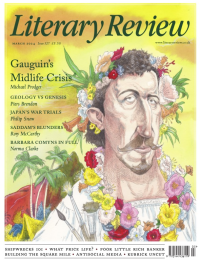Richard Vinen
Last Days of King Coal
Women and the Miners' Strike, 1984-1985
By Florence Sutcliffe-Braithwaite & Natalie Thomlinson
Oxford University Press 279pp £35
The British Miner in the Age of De-Industrialisation: A Political and Cultural History
By Jörg Arnold
Oxford University Press 328pp £35
The miners’ strike of 1984–5 must be the most well-worked seam in British labour history. Is there anything new to say? Two books by young scholars seek to answer this question partly by approaching the strike from unexpected angles. Florence Sutcliffe-Braithwaite and Natalie Thomlinson focus on women (in large measure miners’ wives) and the strike. This is not, in itself, a new topic, but they change the perspective partly by looking back a long way before 1984. At the time, some argued that the strike transformed the lives of women in mining communities, making them more politically active and shaking structures of patriarchal authority. Drawing on the work that sociologists published in the 1990s as well as their own interviews, Sutcliffe-Braithwaite and Thomlinson challenge this interpretation. For them, there was no sudden moment of liberation in 1984. Rather, miners’ wives had seen their lives change over a period that stretched back to the 1960s. The claustrophobia of the isolated pit village largely dissipated as men moved to work in new mines, to which they sometimes commuted by car. As a result, it became easier for women to work (often part-time) outside the home.
Miners’ wives did not, on the whole, think of their lives in the terms used by the middle-class left-wingers who supported them in 1984. They often found they had little in common with the students in dungarees and Greenham Common badges who turned up to show solidarity with the strikers; one miner’s wife insisted that she was a ‘family woman’, not a feminist. In practice, though, miners’ wives believed in some degree of equality and respect between the sexes, which they hoped to achieve within marriage. One feature of the 1970s (not only among miners) was a redefinition of gender roles that did not always set ‘tradition’ against ‘emancipation’ in a simple way. In 1977, at a festival in Blackpool to mark the thirtieth anniversary of the nationalisation of coal mining, young women wore bathing suits to compete for the title ‘Coal Queen’ (the event was sponsored by Babycham). The competitors, who included a secretary, a bank clerk and a scientific technician, seem to have enjoyed a fair degree of economic independence.
Relations between women and the strike were complicated. Most women backed their menfolk, but many who supported the strike were relieved when it came to an end. Arthur Scargill, leader of the National Union of Mineworkers (NUM) from early 1982, pulled strings in the Women Against Pit Closures organisation. His

Sign Up to our newsletter
Receive free articles, highlights from the archive, news, details of prizes, and much more.@Lit_Review
Follow Literary Review on Twitter
Twitter Feed
Under its longest-serving editor, Graydon Carter, Vanity Fair was that rare thing – a New York society magazine that published serious journalism.
@PeterPeteryork looks at what Carter got right.
Peter York - Deluxe Editions
Peter York: Deluxe Editions - When the Going Was Good: An Editor’s Adventures During the Last Golden Age of Magazines by Graydon Carter
literaryreview.co.uk
Henry James returned to America in 1904 with three objectives: to see his brother William, to deliver a series of lectures on Balzac, and to gather material for a pair of books about modern America.
Peter Rose follows James out west.
Peter Rose - The Restless Analyst
Peter Rose: The Restless Analyst - Henry James Comes Home: Rediscovering America in the Gilded Age by Peter Brooks...
literaryreview.co.uk
Vladimir Putin served his apprenticeship in the KGB toward the end of the Cold War, a period during which Western societies were infiltrated by so-called 'illegals'.
Piers Brendon examines how the culture of Soviet spycraft shaped his thinking.
Piers Brendon - Tinker, Tailor, Sleeper, Troll
Piers Brendon: Tinker, Tailor, Sleeper, Troll - The Illegals: Russia’s Most Audacious Spies and the Plot to Infiltrate the West by Shaun Walker
literaryreview.co.uk